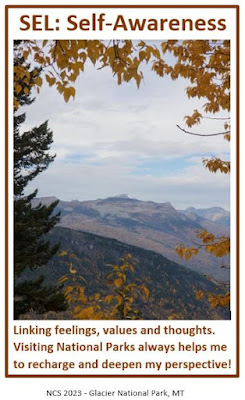Learning to manage our own emotions can only happen after we become aware of them. This is why SEL education is so crucially important in all levels of education - it doesn't matter whether you are 3 or 13 or 93 years old (or anything in between!), we still benefit from being able to manage our stress and motivations. I discuss SEL every day in my work - my students are teachers earning their M.Ed. degrees.
Before I started to really discuss and write about SEL and dig deeper into Resilience Science, I already knew that beach walks always made me feel better. Now I also know why it happens: managing my emotions helps me to adjust to external demands of work and life. For me, personally, the salty smell of the ocean and the sound of crashing waves is insanely relaxing.
Resilience is like a muscle that we can train with practice (instead of an inherent trait of personality), and all our positive experiences can contribute for us to become more resilient over time.
The important part is to find something that work for you. Something that you enjoy, so that it is not a chore.






